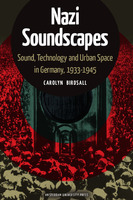Nazi Soundscapes
Sound, Technology and Urban Space in Germany, 1933-1945
Abstract
Following the formation of the German National Socialist Party in the 1920s, various forms of sound (popular music, voice, noise and silence) and media technology (radio and loudspeaker systems) were configured as useful to the party's political programme. Focusing on the urban "soundscape" of Düsseldorf, the author makes a persuasive case for investigating such sound events and technological devices in their specific contexts of production and reception. Nazi Soundscapes identifies strategies for controlling space and reworking identity patterns, but also the ongoing difficulties in manipulating mediated sounds and the spaces of listening reception, whether in the home, workplace, the cinema, public rituals or with wartime siren systems. The study revises visualist notions of social control, and reveals the disciplinary functions of listening (as eavesdropping) as well as the sonic dimensions to exclusion and violence during Nazism. An essential title for everyone interested in the links between German political culture, audiovisual media and urban history, Nazi Soundscapes provides a fascinating analysis of the cultural significance of sound between the 1920s and early 1940s. Click "http://soundclips.humanities.uva.nl/">here for the sound clips discussed in the book. Na de formatie van de NSDAP in de jaren '20 werden verschillende vormen van geluid (stem, ruis, stilte, populaire muziek) en mediatechnologieën (radio- en luidsprekersystemen) ingezet voor hun politieke programma. Vanuit de historisch invalshoek van het stedelijke 'soundscape' van Düsseldorf, onderzoekt de auteur de productie en receptie van deze geluiden en technologieën. Nazi Soundscapes brengt in kaart hoe het politieke bestel de stedelijke ruimte en identiteitsformatie van burgers door middel van geluid beïnvloedt. Het geeft een kritisch perspectief op zowel visuele als auditieve manieren van controle en discipline, in het bijzonder bij uitsluiting en geweld tijdens het nationaal-socialisme (1933-1945). Nazi Soundscapes geeft een fascinerende kijk op de culturele betekenis van geluid tussen de jaren twintig en veertig. Een essentieel boek voor lezers met een interesse in de Duitse politieke cultuur, moderne media en stedelijke geschiedenis. Luister "http://soundclips.humanities.uva.nl/">hier naar de geluidsfragmenten die in het boek worden besproken.
Keywords
geschiedenis; media technology; history; germany; soundscapes; listening; nazi; propaganda; popular music; radio; urban cities; Adolf Hitler; Carnival; Düsseldorf; NazismDOI
10.26530/OAPEN_424532ISBN
9789089644268OCN
995248505Publisher
Amsterdam University PressPublisher website
https://www.aup.nl/Publication date and place
2012Classification
c 1938 to c 1946 (World War Two period)
Far-right political ideologies and movements
Political control and freedoms
Film, TV and Radio industries


 Download
Download